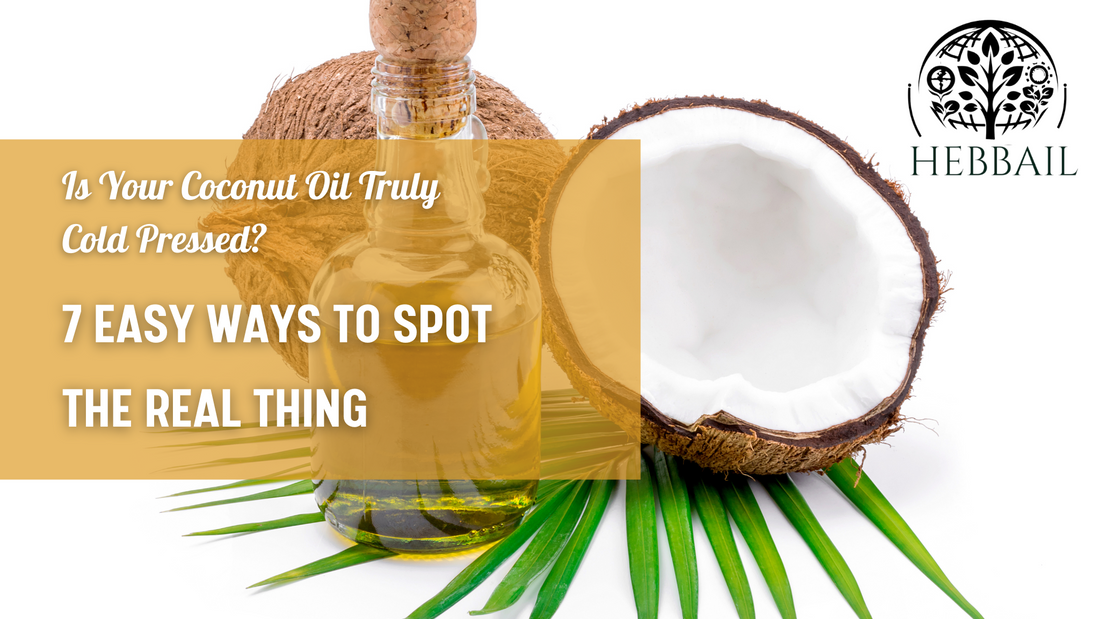
How to Check If Your Coconut Oil is Really Cold Pressed
Share
Don’t fall for labels — know how to spot the real thing.
In a market flooded with flashy packaging and health buzzwords, “cold pressed coconut oil” has become a term many brands use — but few truly live up to.
So how do you know if what you’re buying is genuinely cold pressed or just a refined oil wearing a natural disguise?
Let’s break it down and give you the confidence to make the right choice for your health and family.
🔍 What Does “Cold Pressed” Really Mean?
Cold pressing is a method of oil extraction where no external heat is applied, and the oil is slowly pressed from dried coconut meat (copra) using a wooden or stone press, typically known as chekku or ghani.
This slow process retains:
-
Natural antioxidants
-
Vitamin E
-
Lauric acid
-
The rich coconut aroma and flavor
Unfortunately, many oils labeled "cold pressed" are not truly cold pressed. They’re mass-produced using mechanical expellers at high speeds and temperatures, stripping away nutrients and essence.
⚠️ Why It Matters
Fake or partially refined oils:
-
Lose most of their nutrients
-
Have bland taste and smell
-
May be chemically deodorized or bleached
-
Are not suitable for oil pulling, baby massage, or therapeutic use
✅ How to Check If Your Coconut Oil Is Truly Cold Pressed
Here’s a simple 7-point checklist to help you spot authentic cold pressed coconut oil:
|
Checkpoint |
What to Look For |
|
1. Aroma |
Should smell like fresh coconuts. Mild but natural. No chemical, burnt, or plastic-like smell. |
|
2. Color |
Slightly off-white or golden hue when solid; clear when liquid. Pure white with extreme clarity = possible refining. |
|
3. Texture |
Solidifies below 24°C. Look for grainy texture when solid — a natural trait. |
|
4. Packaging |
High-quality cold pressed oils are stored in glass jars (not plastic) to avoid chemical leaching. |
|
5. Label Transparency |
Does the brand mention: extraction method, source location, and processing details? If not — red flag. |
|
6. Price Point |
True cold pressed oil costs more. If it’s too cheap, it’s too good to be true. |
|
7. Source of Coconuts |
Ask: Are they using native varieties? Free from chemical spraying? Cold pressed oil reflects the purity of its source. |
🧪 Bonus Test: The Freezer Test (Optional)
-
Place your oil in the fridge for 1–2 hours.
-
It should solidify evenly and form a consistent texture.
-
If you see uneven layering or separation, it may have been blended or refined.
Note: This is not 100% foolproof — but it’s a quick check to detect obvious adulteration.
🌿 Hebbail’s Promise of Purity
At Hebbail, our cold pressed coconut oil is:
-
Made in wooden ghani (chekku)
-
Extracted below 40°C, preserving all nutrients
-
Sourced from native Western Ghat coconuts
-
Filtered, not refined
-
Packaged in food-grade glass jars
Every drop carries the aroma of real coconuts, the wisdom of traditional methods, and the assurance of purity.
🛒 The Right Oil Makes All the Difference
Whether you’re using coconut oil for cooking, skin care, baby massage, or oil pulling — you deserve the real thing.
Don’t let packaging fool you. Choose authenticity. Choose Hebbail.
